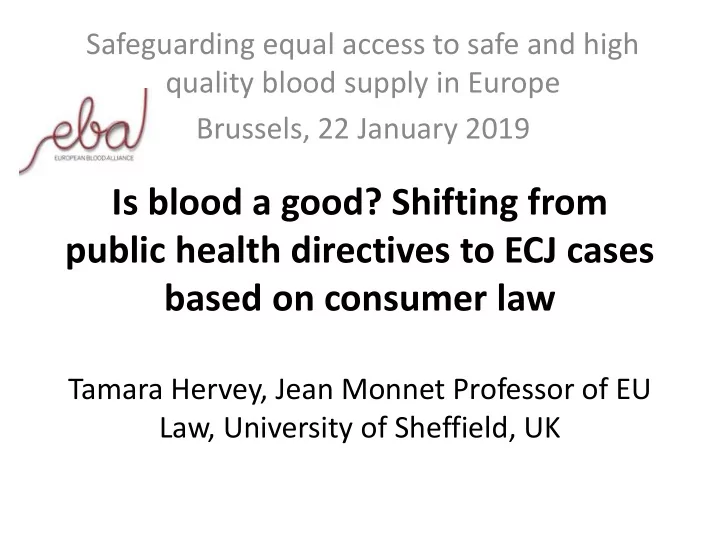

Safeguarding equal access to safe and high quality blood supply in Europe Brussels, 22 January 2019 Is blood a good? Shifting from public health directives to ECJ cases based on consumer law Tamara Hervey, Jean Monnet Professor of EU Law, University of Sheffield, UK
The layers of EU law on blood and blood products • Substances of human origin are not ‘products’ – Directive 98/44/EC on the Legal Protection of Biotechnological Inventions, Articles 5 & 6 – Directive 2002/98/EC on Blood Safety, rec 1, legal basis Article 168 TFEU – EU Charter of Fundamental Rights, Article 3 (2) • Medicinal products derived from blood or plasma are ‘products’ – Directive 2001/83/EC, Article 1, inverts lex specialis – C-512/12 Octapharma – C-421/09 Humanplasma; C-296/15 Medisanus
Making sense of EU law on blood • Appears to be about markets, and risk regulation within markets • But more than that – EU legislation articulates ethic of care • Blood Directive Article 20 voluntary blood donation • EU self-sufficiency in blood & blood products (eg Directive 2001/83, rec 19; Directive 2002/98, rec 4) • EU Clinical Trials Directive and Regulation prohibit financial incentives – EU law articulates ethic of dignity & human rights • Implementing Directive 2005/62/EC informed consent provisions • EU CFR Article 3 integrity of the person, non-commodification; Article 1 human dignity • See also Neth v Parl & Council (Biotech) Brustle; International Stem Cell – CJEU respects national preferences (eg Humanplasma, Leger ), except where disproportionate protectionism (eg Humanplasma, Medisanus ) or breach of general principles of EU law (eg Leger ) • However, scope for greater specificity in EU legislation, leaving less room for courts to act
Recommend
More recommend